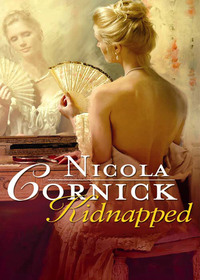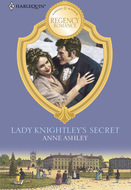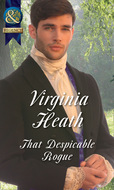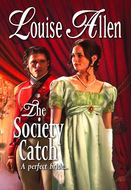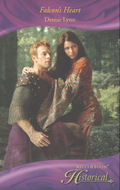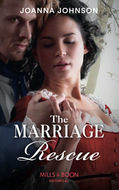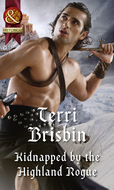Kitap dosya olarak indirilemez ancak uygulamamız üzerinden veya online olarak web sitemizden okunabilir.
Kitabı oku: «Kidnapped: His Innocent Mistress»
The moment in which I set out upon my journey to the house of Glen Clair and Mr. Sinclair behaves as no gentleman should.
I drew a deep breath. My heart was hammering. “Are you, by any chance, asking me to be your mistress, Mr. Sinclair?”
A disturbingly sensuous smile curled Neil Sinclair’s lips. “Would that be so very bad, Miss Balfour? I am offering you a comfortable home instead of a ruin in the back of beyond with relatives who do not want you.”
“You are not offering it for nothing!”
His smile deepened. He put out a hand and touched my cheek gently. I was so shocked at the physical contact that I jumped.
“All I ask in return,” he said, “is something that should be intensely pleasurable for both of us.”
Once again I felt that jolt deep inside me. I swallowed hard and pushed away the heated images of lust and loving.
“I thought,” I said, “that you did not even like me very much.”
I saw something primitive and strong flare in his eyes, scorching me.
“Then you know little of men, Miss Balfour,” he said. His tone had roughened. “I wanted you from the first moment I saw you.”
Kidnapped: His Innocent Mistress
Harlequin®Historical
To Elspeth and Sheila, the original Miss Bennies and
so much nicer than their fictional counterparts!
Author Note
A few years ago my mother-in-law gave me an ancient copy of Robert Louis Stevenson’s classic novel Kidnapped as a birthday present. I had read and enjoyed the book many years before and now I picked it up again and was plunged into a world of romance and intrigue and adventure. When I finished it I thought how exciting it would be to write my own version, inspired by the original, and so the idea of Kidnapped: His Innocent Mistress was born. My husband’s family are Scots and we visit the Scottish Highlands every year, so I used all the places I know and love as the setting for my book. Writing a book set in Scotland was such a thrill that I definitely plan to write a sequel!
I hope that you enjoy Kidnapped: His Innocent Mistress, which is a homage to both Robert Louis Stevenson’s wonderful story and to Scotland, one of the most beautiful countries on earth.
NICOLA CORNICK
KIDNAPPED: His Innocent Mistress

MILLS & BOON
Before you start reading, why not sign up?
Thank you for downloading this Mills & Boon book. If you want to hear about exclusive discounts, special offers and competitions, sign up to our email newsletter today!
Or simply visit
Mills & Boon emails are completely free to receive and you can unsubscribe at any time via the link in any email we send you.
Available from Harlequin® Historical and NICOLA CORNICK
The Virtuous Cyprian #566
Lady Polly #574
The Love Match #599
“The Rake’s Bride”
Miss Verey’s Proposal #604
The Blanchland Secret #630
Lady Allerton’s Wager #651
The Notorious Marriage #659
The Earl’s Prize #684
The Chaperon Bride #692
Wayward Widow #700
The Penniless Bride #725
*The Notorious Lord #759
*One Night of Scandal #763
*The Rake’s Mistress #767
A Regency Invitation #775
“The Fortune Hunter”
Lord Greville’s Captive #827
Christmas Wedding Belles #871
“The Pirate’s Kiss”
*The Last Rake in London #899
Kidnapped: His Innocent Mistress #935
Also available from
HQN™ Books
Christmas Keepsakes
“The Season for Suitors”
Deceived
Lord of Scandal
Unmasked
All’s fair in love and matrimony in Nicola Cornick’s wildly romantic new series Brides of Fortune. Meet the ladies of Fortune’s Folly—spirited heiresses who are more than a match for society’s most dashing rogues!
Coming this summer from HQN Books!
THE CONFESSIONS OF A DUCHESS
THE SCANDALS OF AN INNOCENT
THE UNDOING OF A LADY
Praise for Nicola Cornick’s HQN novels
“A beguiling blend of danger and desire.”
—Booklist on Unmasked
“Cornick expertly spices her latest Regency historical with danger, while the sizzle she cooks up between her sinfully sexy hero and delightfully resourceful heroine is simply spectacular.”
—Booklist on Lord of Scandal
“Nicola Cornick creates a glittering, sensual world of historical romance that I never want to leave.”
—bestselling author Anna Campbell
Contents
Chapter One
Chapter Two
Chapter Three
Chapter Four
Chapter Five
Chapter Six
Chapter Seven
Chapter Eight
Chapter Nine
Chapter Ten
Chapter Eleven
Chapter Twelve
Chapter Thirteen
Chapter Fourteen
Chapter Fifteen
Chapter Sixteen
Chapter Seventeen
Chapter Eighteen
Chapter Nineteen
Chapter One
In which I meet the hero, as all good heroines should.
My name is Catriona Balfour and this is the story of my adventures. I will begin on a certain afternoon early in the month of July in the year 1802, when I buried my father in the graveyard at Applecross, beside the sea. I was eighteen years old.
A melancholy beginning, perhaps. Truth is, it had been a melancholy year. My mother had been taken a bare two months before, carried off by a fever brought to the village by a travelling peddler who came selling ribbons and buckles, gloves and scarves. My mother had bought a length of muslin for a new summer gown. When she died the pattern was only half made.
I stood by my father’s fresh-turned grave and thought that at the least he had a fine view. The curve of the bay was before us, in all its harebell-blue beauty. Beyond it, across the shining water, were the jagged tops of the mountains of Skye. The air was soft that summer morning, and smelled of salt and seaweed. The sun was warm on my back and my best black bombazine dress—dreadfully disfiguring—crackled when I moved, the material so stiff that the gown would have stood up on its own. I admit it—even as I stood there, hazy with grief, I was aware of the ugliness of that dress and I was ashamed of myself. Ashamed that on the day of my father’s funeral I could be thinking of fashion and wishing for a silver gauze scarf from Edinburgh, perhaps, or a pair of soft kid slippers.
‘The child is vain, madam,’ Mrs Mansell, the housekeeper, had said to my mother all those years ago, when I was eight and she had found me standing before the mirror trying my mother’s Sunday best bonnet. ‘Take the rod to her before it is too late.’
But my mother liked pretty things herself and instead of beating me she wrapped me in a scented hug and whispered that I looked very fine. I remember smiling triumphantly at Mrs Mansell over my mother’s shoulder. Her thin mouth turned down at the corners and she muttered that I would come to a bad end. But perhaps she was only envious because she had a face like a prune and no one to love her since Mr Mansell had passed away, and possibly he had not loved her anyway.
My mother was warm and loving, and my father too, doting on her and on me, their only child. He was the schoolmaster at Applecross and had taught me my lessons from the age of three. As a result I was the only young lady in the Highlands who could plot a mathematical course by the stars, or who knew the botanical names of all the plants that grew thick by the burn. The squire’s daughters, Miss Bennie and Miss Henrietta Bennie, giggled and said that such knowledge would not help me catch a husband. They spent their days playing the spinet or painting in water-colours, whilst I grew sunburnt red helping Old Davie set his crab pots, or walking by the sea without my parasol.
The Miss Bennies were present at the funeral that morning, standing with the squire and his wife a little apart from the rest of us. Of the other mourners present, we were split into a group of villagers and a separate small enclave of my father’s academic colleagues, who had travelled from Edinburgh to pay their respects. I was touched that they had held Papa in such high esteem as to make the journey. Sir Compton Bennie’s face was grave as he looked down at the coffin. He and my father had shared the occasional glass of malt whisky and game of cards. That had been to the disapproval of his wife. Lady Bennie was a woman very conscious of rank and consequence, and she had not considered the poor schoolmaster worth cultivating. I once heard her refer to me as ‘that fey, ill-favoured child’ when I was about six years of age, and it was true that I had been thin as a rake then, with tangled red-golden hair and a challenging expression in my blue eyes that my father had always commented was fierce enough to scare the wolves away.
There had not been wolves at Applecross for more than a half century now, and I hoped that time had also filled out my figure a little, smoothed the wayward curl of my hair and softened the fierceness in my expression. I was no longer as ill favoured as I had been as a child, although there was nothing I could do about the firm, determined lines of my cheek and chin, the fairness of my eyelashes or the unfashionable freckles that were not only scattered across my face but also sprinkled over the rest of my body. My hair was as thick and springy as the heather, and grief had turned me gaunt. I knew I was no beauty. I did not need the pink and gold prettiness of the Miss Bennies to point it out to me.
I noticed that today Lady Bennie was wearing her second best black gown, thereby conferring on the event precisely the right degree of importance; as first lady of the district it was her duty to attend, but despite the fact that she dabbed her eyes most prettily with her black-edged kerchief I knew it was all for display. The Miss Bennies had not the skill of their mother. Their boredom was plain to see as they fretted and fidgeted and even whispered under cover of the minister’s words.
‘Ashes to ashes…’
I threw a handful of earth onto the coffin and it rattled on the top. Tears made my throat ache.
‘Dust to dust…’
Poor Papa. There had been so many things that he had still wanted to do. I felt so angry that he had been denied the chance. Someone, somewhere in the congregation, stifled a sob. Applecross folk were not the sort to cry, but my father, David Balfour, had been well loved. I had not needed to pay way mourners to attend his funeral, as Sir Compton Bennie was rumoured to have done when his father had passed away. But then Sir Compton’s father had sided with the English in the harrying of the Highlands fifty years before, and people here had long memories…
‘Come, Catriona…’ The service was over and Mr Campbell, the minister, took my arm to guide me down the path to the lych gate. I paused for a moment, gazing at the raw scar of the grave. Douglas, the gravedigger, was leaning on his spade, impatient to be finished there. I looked down on my father’s coffin and for a moment felt a desolation so vast, so terrifying, that I had to push it away, because I was afraid my mind would disintegrate under the pain of it.
I was an orphan.
I had no money.
I had no home.
Mr and Mrs Campbell had broken this news to me the previous night, gently, over a beaker of milk laced with whisky to help me sleep. Since my father’s death I had been staying at the manse because it had not been seemly for me, a young woman, to continue to live alone in the schoolmaster’s house. What I had not realised, though, was that I was never to return there. The house belonged to the Charity of St Barnabas, which had employed my father. The trustees had already arranged for a new schoolmaster to come from Inverness to fill the vacancy. He and his wife and young family were expected any day soon. It seemed like unseemly haste to me, but then the charity were efficient, and did not wish the children of Applecross to have an unofficial holiday for longer than need be.
The trustees of St Barnabas had not been ungenerous. They had paid the funeral expenses, and had also sent Mr Campbell the sum of five pounds ‘to provide for the daughter of the late schoolmaster.’ I was bitter; I thought how fortunate it was for the trustees that my mother had died a few months before, thereby sparing them the necessity of paying a further ten pounds for his widow. Mr Campbell had reproved me when I had said this, but he had done it kindly, because he knew I was miserable. But to me it seemed that my father was a footnote: recorded in the charity’s ledgers, then swept aside, dismissed, forgotten. Deceased. I could imagine them drawing a thick line in black ink under his name.
We were to go to the schoolmaster’s house for the last time now, to attend the wake.
The old path down from the churchyard was uneven, the stone cobbles grown thick with moss. Out in the bay the seabirds wheeled and soared, calling their wild cry. The sun was hot and it made my head ache. I wanted to seek the cool darkness of the shadows and hide away, to think about my parents on my own. I did not want to have to share my memories of them, or stand in the stone-flagged parlour of my old home feeling that I was a stranger there now as I made polite conversation with the mourners.
We reached the garden gate. Mr Campbell and I were at the head of an untidy straggle. Immediately behind us were the Bennies. Lady Bennie was accustomed to going first into all the drawing rooms in the county. I reflected that it had taken the death of my father to get her to concede precedence to me. It was never likely to happen again.
A little muted conversation had broken out behind us as we walked, but suddenly it hushed so quickly that I was pulled out of my self-absorption. I felt Mr Campbell stiffen with surprise, and for a moment his step faltered. Then a man came forward from the shadow of the garden gate and stopped before us. He was in the uniform of the King’s Royal Navy, and the austerity of the costume suited his tall figure well.
He knew it, too. He carried himself with an unhurried self-assurance, and there was an arrogant tilt to his head and a gleam in his eyes—eyes that were so dark that their expression was inscrutable.
I sensed rather than saw the Misses Bennie shift and bob behind me, like the tall poppies that grew by the roadside in high summer. They were positively begging for his notice. I raised my chin and met the dark gaze of the stranger very directly.
The air was suddenly still between us. Somewhere far away, in the furthest recesses of my body, my heart skipped a beat, and then carried on as though nothing had happened.
‘Mr Sinclair,’ Mr Campbell said, and I heard a tiny shade of uncertainty in his voice. ‘We did not expect—’
The stranger had not taken his eyes from me, and now he removed his hat and bowed. He was young—perhaps five or six and twenty. The sunlight fell on his thick, dark hair and burnished it the blue black of a magpie’s wing.
‘Magpies are dangerous thieves,’ my father had once said when we were discussing the ornithology of the British Isles. ‘They are clever and reckless and untrustworthy.’
It was strange to remember that now.
The man had taken my hand. I had definitely not offered it, and I wondered how on earth he had possessed himself of it. He wore no gloves, and I was conscious that the inexpert darning on mine would be all too evident to his touch. I tried to pull away.
He held me fast.
This was most improper. There was a glimmer of amusement in his eyes now that made me feel as though the sun beating down on my bonnet was far too hot.
‘Miss Balfour,’ he said, ‘please permit me to introduce myself and to offer my deepest sympathy on your loss. My name is Neil Sinclair.’
His voice was very smooth and mellow, like a caress.
There was a gasp behind me. The Miss Bennies were not good at dissembling their feelings. I sensed that in that moment they would almost have been happy to be attending their own father’s funeral if it had entailed an introduction to this man. But he was not looking at them. He was looking at me.
And that was how I met Neil Sinclair, Master of Ross and heir to the Earl of Strathconan.
Chapter Two
In which I hear of my long-lost family.
It was late. The funeral supper was eaten, the casks of ale had run dry and the schoolmaster’s house was scoured clean, locked and barred once more against the arrival of its new owner. I had worked my fingers to the bone to tidy up after our guests; anything to block out the cold sense of loss that threatened to break me.
Now there was no more to do, and I stood in the gardens for the last time and breathed in the heady scent of the roses my mother had coaxed to grow against the sheltered southern wall. Across the village green the lamps were lit in the manse, and the moths were bumping against the windows, trying to get to the light. The sea was calm and its sighing was a muted hush on the sand. The evening was sapphire-blue, with a half moon rising, and very peaceful, though cooler now that the sun had gone.
I crossed the green and let myself into the manse by the back door. The house was very quiet, but from Mr Campbell’s study came the sound of voices. I had no taste for company that night, and I was about to go past and seek the comfort of my room when Mrs Campbell came around the curve of the passageway. Her face warmed into a smile of relief to see me.
‘There you are, Catriona! Mr Campbell was asking for you.’
I sighed inwardly. I knew that Neil Sinclair was with Mr Campbell, and I had no wish to seek his further acquaintance. After he had greeted me he had spent the rest of my father’s wake talking with Sir Compton Bennie and with Mr Campbell, and I still had no notion as to what he was doing here. Occasionally I had felt him watching me across the room, and had glanced up to meet the same speculative interest in his dark eyes that I had seen when we first met. I had no experience with men but I sensed that his interest had little or nothing to do with me as a woman. Instead I suspected that he knew something about me and was measuring me in some way, assessing my character. For some reason this annoyed me.
I knocked on the study door and went in, Mrs Campbell following me. The minister was seated at his desk, with Mr Sinclair in a chair beside the fire with a glass of the finest malt whisky on the table beside him. He looked up when I came in. He had a thin, watchful face, tanned a dark brown from sea and sun—a face with character and resolution in the line of his jaw. I gave him a cool nod, which seemed to amuse him, and addressed myself to Mr Campbell.
‘You wished to see me, sir?’
I spoke very politely but I saw the flash in Mr Sinclair’s eyes that suggested he thought this obedience out of character. A faint smile curled the corner of his firm mouth. I turned a shoulder to him.
‘Catriona…Yes…’ Mr Campbell seemed flustered, which was unusual to see. He gestured me to the long sofa. This piece of furniture was the most uncomfortable in the house, and necessitated me to sit upright as though I were a bird perched on a twig. This did nothing to improve my temper, especially as Mr Sinclair seemed deliberately to lounge back indolently in his chair with a sigh of contentment as he sipped his whisky and watched me over the brim of the glass.
Mrs Campbell had followed me in, and now hastened to see to her visitor’s comfort. ‘You have had sufficient to eat and drink, Mr Sinclair? May I fetch you anything else?’
I watched the gentleman smile his thanks and put Mrs Campbell at her ease. He had a very easy charm. I could not deny it. When Mrs Campbell went out again her face was flushed peony-pink, like a young girl’s.
‘Well, now,’ Mr Campbell said, shuffling the papers on his desk, ‘there are matters to be settled, Catriona. Matters to do with your future. You know that Mrs Campbell and I love you as though you were our own daughter, but I have been thinking that now your parents have passed on the natural place for you is with your remaining relatives.’
I assumed that he meant my mother’s family, who lived far, far away on the south coast of England. My mother had made a scandalous match twenty years before when, as a young debutante, she had visited Edinburgh, fallen in love with my father, a poor schoolmaster, and eloped with him. Her family had cast her out after that, and I had absolutely no intention of going to them cap in hand now, when they had ignored my existence for eighteen years.
‘Can I not stay here, sir?’ I asked. ‘Here in Applecross, I mean,’ I added, in case poor Mr Campbell had thought I was suggesting I should live on his charity indefinitely. I knew it must be a wrench for him to speak of my going, for it was true that not only was he my godfather but he and Mrs Campbell had cherished me like their own.
‘I could work for a living,’ I added. ‘Perhaps I could help the new schoolmaster, or act as companion to old Miss Blois…’
Mr Sinclair smothered what sounded suspiciously like a snort. I looked at him.
‘I beg your pardon, sir?’ I said frigidly.
There was laughter in his eyes. ‘Forgive me, Miss Balfour,’ he said, ‘but I cannot see you as companion to an elderly lady. Nor as a schoolmistress, for that matter.’
I set my lips in a thin line. I did not see what business it was of his. ‘You do not know me very well, Mr Sinclair,’ I said. ‘My father taught me himself, having no prejudice against the education of females. I can teach reading, and I write a very fair hand, and I am learned in mathematics and astronomy and philosophy and…’ I ran out of breath in my indignation.
‘I do not quarrel with your father’s abilities as a tutor,’ Mr Sinclair said lazily, ‘nor indeed with yours as a scholar, Miss Balfour. I am sure you are most accomplished. It is simply that I have seen no evidence that you have the temperament required to do the job of schoolteacher yourself. Would it not require patience and tolerance and composure, amongst other things?’
I was so angry at his presumption that I almost burst there and then. ‘Well, I do not see it is any concern of yours—’ I began crossly, but Mr Campbell made a slight movement and I subsided, holding fast to the fraying shreds of my temper.
‘It would not serve, Catriona,’ he said. ‘Applecross is a small place and it is time for you to go out into the world—the sooner the better. I have already had three requests from gentlemen for your hand in marriage, and have no desire to be turning more away from my door.’
I was astonished. Not one single gentleman had approached me with a view to marriage, and I could not imagine who could have asked Mr Campbell for permission to pay their addresses to me. I stared at him in puzzlement.
‘Who on earth…?’
Mr Campbell ticked them off on his fingers. ‘McGough, who farms up beyond Loch Ailen, young Angus the shepherd and Mr Lefroy of Callanish.’
This time there was no doubt that Neil Sinclair was laughing. His shoulders were positively shaking. I tried to ignore him whilst inside me the anger seethed at his discourtesy.
‘McGough has buried three wives already,’ I said, ‘young Angus is kind, but a mere lad, and Mr Lefroy wants a housekeeper he does not have to pay for.’
‘A wife is more expensive than a housekeeper in the long run,’ Mr Sinclair observed casually.
I swung around and glared at him. ‘Do you know that for a fact, sir?’
His dark eyebrows went up. ‘Not from personal experience, madam,’ he drawled, ‘but I do know on the strength of a few hours’ acquaintance that you would no more make a biddable wife than you would a suitable lady’s companion.’
We looked at one another for what seemed like a very long time, whilst the air fizzed between us and all the discourteous, unladylike and plain rude things that I wanted to say to Mr Sinclair jostled for space in my head. I could see a distinct spark of challenge in his eyes as though he was saying, Do you wish to quarrel further, Miss Balfour? You need only say the word…
Then Mr Campbell cleared his throat.
‘Which is nothing to the purpose, Catriona, since your papa, when he knew he was dying, wrote to his relatives at Glen Clair to ask that they offer you a home.’
Mr Sinclair shifted in his chair. ‘It is all arranged. I am here to escort you to Sheildaig on the morrow, Miss Balfour. Your uncle will send a carriage to collect you from the inn there.’
For the second time in the space of as many minutes I was silent with shock. How could Papa have arranged such a thing without telling me? Who was this uncle and his family of whom I had heard nothing until this moment, and why should they, who were strangers to me, wish to give me a home? Most importantly, how could it all be arranged when this was the first that I had heard of it?
I took a deep breath and, ignoring Mr Sinclair completely, addressed myself to the minister.
‘I beg your pardon, sir,’ I said carefully, ‘but you find me completely amazed. I did not know my father had any relatives in the world, let alone that they would be prepared to give me a home.’
Mr Campbell was now looking even more uncomfortable, and Mr Sinclair positively bored. He sighed, toying with the whisky in his glass, swirling it around and around. One lock of dark hair had fallen across his brow, giving him an even more rakish air. No doubt my amazement at the discovery of my long-lost family was of little consequence to him, and any attempt at explanation would be terribly tedious for him to endure. He had graciously offered to escort me—for what reason I was still unsure—and his attitude implied that it was my duty to be grateful for his condescension. I reflected that I was fast coming to find Mr Sinclair one of the most objectionable men of my limited acquaintance.
Mr Campbell rubbed his head, setting the sparse strands of hair awry. ‘Truth to tell, Catriona,’ he confided, ‘I scarcely know more myself. When your father was sick he gave me a certain letter and asked me to send it to Glen Clair. He said that it was to do with your inheritance. He asked that as soon as he was gone, the furniture disposed of and the house taken back by the charity trustees, I should send you to the Old House at Glen Clair and to your uncle, Ebeneezer Balfour.’ Here Mr Campbell looked hopefully at Mr Sinclair. ‘Perhaps you have something to add here, sir?’
Mr Sinclair shrugged his broad shoulders—carelessly, I thought. ‘I fear I cannot help you, sir,’ he said. ‘I am come to escort Miss Balfour as a favour to her uncle. That is all I know.’
I looked from one to the other. ‘My father never mentioned that he had a brother,’ I said. ‘All these years I never knew he had any family other than my mother and myself. I do not like to find such matters settled when I have had no say in them.’
Mr Sinclair looked at me. ‘You are familiar with the expression that beggars cannot be choosers, Miss Balfour?’
I glared at him. ‘Mr Sinclair, I do not believe you are contributing anything useful to this situation at all.’
‘Only a means of transport,’ Neil Sinclair agreed affably.
Mr Campbell settled his spectacles more firmly on his nose. ‘Family is always to be cherished,’ he murmured. ‘I know of the Balfours of Glen Clair, of course, but had no notion that your father was related. The Balfours were a great family once. Before the forty-five rebellion.’
‘You mean they were Jacobites?’ I asked, and for a moment it seemed that the very word caused the lamplight to grow dim and the shadows to flicker with secrets.
‘Aye.’ Mr Campbell looked grave. ‘They suffered reprisals for their loyalty.’
Mr Sinclair shifted, and I remembered that he was a Navy man in the service of King George III. The enemy was Napoleon and the French now, not the English, and the old days were long gone. Nevertheless, something in my Highland blood stirred at the old loyalties.
‘These days,’ Mr Sinclair said, ‘the Balfours are as poor as church mice, mistress. There will be no inheritance waiting for you at Glen Clair.’
I smarted that he might think me so shallow that all I cared for was a fortune—although if I were being completely honest a few hundred pounds would not have gone amiss. But I sat up a little straighter and said, ‘If I have found a family I did not know existed then that will be more than enough for me, Mr Sinclair.’
I thought the sentiment rather fine, and was annoyed that he smothered a grin in his whisky glass, as though to say that I was a foolish chit who knew nothing of what I was talking about.
‘We shall see,’ he said cryptically.
I stood up. I had had about enough of Mr Sinclair’s company for one evening. ‘If you will excuse me, sir?’ I said to Mr Campbell.
‘Of course,’ he murmured. His tired blue eyes sought mine and I realised then what an unlooked for responsibility I was to him. He had taken me in out of Christian kindness, love for me and friendship to my late father, but he and Mrs Campbell were getting old, and though they would never say it, they could not want the burden of a eighteen-year-old hoyden.
‘I will go and pack my bags,’ I said. ‘And I do thank you, sir, for I know that you always have my well-being at heart.’
It would take me little enough time to pack, in all conscience. I had barely a change of clothes and the few books that my father had left me.
Mr Campbell looked relieved. ‘Of course, child. I’ll bid you goodnight. I think,’ he added, and I wished there had not been such uncertainty in his tone, ‘that you are doing the right thing, Catriona. Mrs Campbell will accompany you as far as the inn at Sheildaig, under Mr Sinclair’s escort.’
Mr Sinclair said nothing at all, but there was a sardonic gleam in his dark eyes that I disliked intensely. He stood up politely as I left the room, and I felt his gaze on me, but I refused to look at him.
Ücretsiz ön izlemeyi tamamladınız.
